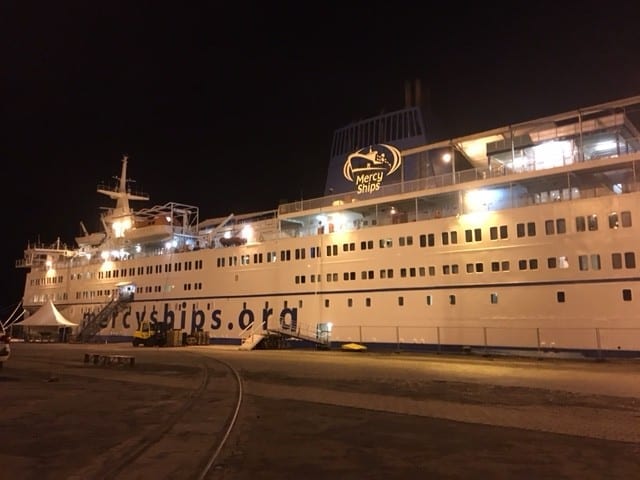Mercy Ships: Holding On


My Soul is Bare and Raw
Every Friday we have to terminally clean our operating rooms. That means we have to take a special cleaning solution and wipe down everything in the room, including the ceilings, cabinets, walls, and floors. We pull all of the equipment out as it is cleaned, placing it in the hallway to dry as we continue to work. For a moment, the room is bare, quiet, and clean.
Today I stood in the middle of that bare, quiet, clean room. I looked around, and I remembered everything that’s happened in that space in the past week. And I thought that sometimes our souls need something similar. A cleansing, to wipe away everything that doesn’t belong, to find quiet and peace for just a moment, to lay bare everything in order to make ready for what’s next in life.
This week required two terminal cleanings.
My soul is bare and raw. I’ve seen the best of people come out in the worst of situations. I’ve seen fervent prayer bring heaven to earth right before my very eyes. I’ve seen a great need and greater selfless giving. There has been unspeakable beauty in the midst of the mess of this week. Suffering that brought compassion. Weakness that brought strength. Chaos that brought unity. To share the good, I have to share the bad. Because that is what makes the good so much sweeter.
We Simply Couldn’t Contain Any More
Monday brought me back to maxillofacial/ENT, mostly removing large goiters, thyroid tumors, and parotid masses. This work is tedious, navigating nerves and vessels to extricate the tissue. It takes patience and time. And it carries huge risks. Nerves need to be identified so they aren’t damaged, causing paralysis in the face, neck, or shoulder. Navigating around major vessels brings a risk of significant blood loss. And postoperatively, neck swelling from the surgery can push on the trachea and make breathing difficult. On Wednesday, my team worked 16 hours; 10 of that was spent removing a thyroid tumor roughly the size of a volleyball from a patient’s neck. On Thursday, a 4-hour case turned into an 8-hour case when the tumor was discovered to have more deeply adhered to major vessels and nerves. And that night, our patient suffered complications from surgery. By Friday morning, the late nights, early mornings, long days, and missed meals had taken their toll.
We sat in a circle in our operating room, much like we do every morning in preparation for our huddle. But this time was different. Everyone was quiet. Even the monitors were silent as we waited for news about our patient.
They think it was a stroke. She’s improved slightly, but she’s still in critical condition.
In that moment, the frustrations of the week overflowed with that single word: stroke. It was like a glass too full had one more drop of water added to it, and we simply couldn’t contain any more. Everyone – the nurses, the anesthetists, the surgeons – took that news personally. We cried, we discussed, we prayed. And it was decided that our team needed rest, so our cases for the day were postponed to Monday. For the good of our team and our patients, we were told to find chaplaincy, to sleep, and to get off the ship.
By evening, our stroke patient had improved dramatically, with only right-sided facial weakness as a residual effect. The rest that had resulted from her initial predicament was providential.
Because that evening, another patient would require all of our energy.
Around 7:30pm, I received a page from my team leader to let me know a patient was bleeding from a surgical wound on the ward. I went with her to assess the situation.
At 8:20pm, I was calling a 911 emergency medical team response to OR 3. By 11:30pm, I had witnessed a miracle.

Witnessing a Miracle
A patient, a few weeks post-op, unexpectedly and suddenly began to hemorrhage. A transfusion was needed but no blood was immediately available. A rapid transfer was made from the ward to the OR to get the bleeding under control. The emergency medical team was called, the OR team was called and surgeons were called. Within 30 seconds, the OR was filled with nurses and physicians ready to claim tasks and save this man’s life. An overhead page was made, calling for anyone who was B positive to come to the lab to donate blood. One of our anesthetists ran to the lab, donated a unit of his blood, and ran it back to the OR to transfuse immediately into the patient. More people lined up outside the lab, ready to donate. Another overhead page was made, asking all crew to stop what they were doing and pray for this patient. Complete strangers came together in the hallways to fervently pray for our patient and our team. Even the patients on the ward helped each other out of their beds to pray for this man.
The surgeons were able to control the bleeding with packing and pressure. We would later discover, via a scan, that a major vessel had ruptured. And he is alive now. Critical, but stable. And responsive. He’s holding on, which is what all of us have done this week.
My friend Deddy described this week perfectly – it feels as if we’re on a roller coaster ride, and it won’t slow down long enough for us to get off. Up and down, around and around. Our heads are spinning and we are tired.
But we’re holding on.
—
In May 2014, Travel Nurse Across America (TNAA) announced a partnership with Mercy Ships, as part of its ongoing philanthropic activities. TNAA sponsored four nurses to volunteer on a healthcare delivery mission in Africa. Mercy Ships, a global charity organization, uses ships – floating hospitals – to provide free surgery and dental care in impoverished countries. Mercy Ships has been in operation since 1978. The nurses sponsored by TNAA worked for eight weeks each on the African mercy ship docked in Cotonou, Benin. Follow the TNAA blog for Mercy Ships updates.







